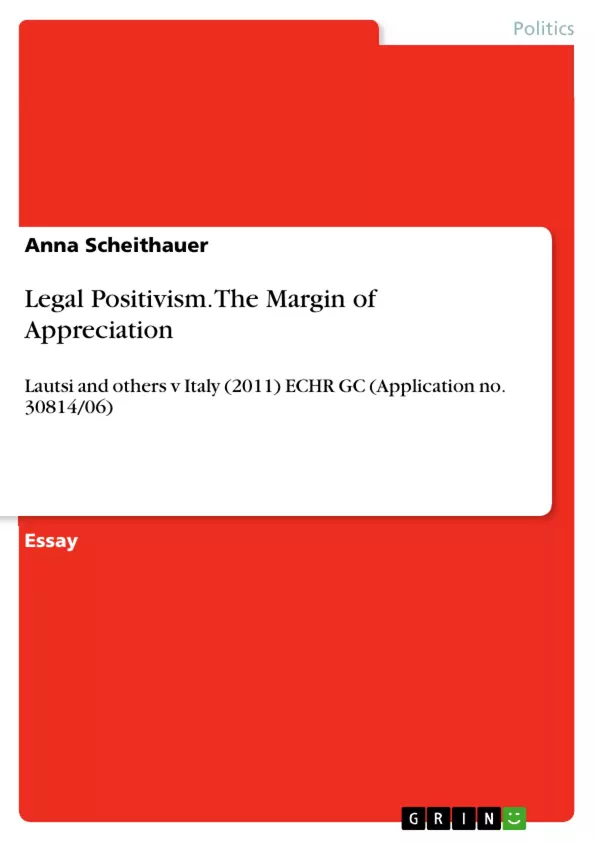In this essay, I have discussed the cogency of using legal positivism as a method applied in judicial human rights cases. Doing so, I have concentrated on H.L.A Hart's version of “soft” positivism, which puts emphasis on law as a coercive order based on the observation of social facts, and which stresses the separability of law and morality. The soft element of his approach shows with the former by going beyond lege lata taking into account also rules created by mere convention, and by the latter granting morality indirectly a place in law by vesting it in previously legally validated Rules of Recognition, the ultimate rules in a legal system specifying what the law is and indicating which obligations arise from it. (Hart, 1961) I have critiqued the positivist method from the interpretivist perspective focusing on Dworkin's account thereof, which accentuates law as integrity. His approach defines law by principles rather than rules, and as an attempt by society to generate public moral standards. Thereby, weighty considerations are at the heart of legal reasoning in order to fulfill requirements of justice and fairness. (Dworkin, 1986)
Table of Contents
- The Margin of Appreciation: Rules over Principles
- The Margin of Appreciation as a Rule of Recognition and Adjudication
- Positive Obligations and the Scope of the Margin of Appreciation
- The Margin of Appreciation as a Rule: A Lack of Coherence?
Objectives and Key Themes
This essay examines the effectiveness of legal positivism as a method in judicial human rights cases, focusing on the Margin of Appreciation doctrine applied by the European Court of Human Rights in the Lautsi v. Italy case. The analysis contrasts the positivist perspective with the interpretivist approach, particularly Dworkin's concept of law as integrity.
- The role of legal positivism in human rights adjudication
- The Margin of Appreciation doctrine as a Rule of Recognition and Adjudication
- The limitations of legal positivism in interpreting legal rules
- The importance of contextual interpretation and principles in legal reasoning
- The potential for inconsistency and lack of coherence in the application of the Margin of Appreciation
Chapter Summaries
The first section delves into the origins and rationale of the Margin of Appreciation doctrine, tracing its roots in German and French municipal law and its application under the European Convention of Human Rights. It explores the potential for ambiguity in interpreting the doctrine within a legal positivist framework.
The second section focuses on the application of the Margin of Appreciation doctrine in the Lautsi v. Italy case, analyzing it as both a Rule of Recognition and a Rule of Adjudication. It examines the Court's reasoning and the potential for indeterminacy in determining the scope and content of the doctrine.
The third section investigates the concept of "positive obligations" and their implications for the scope of the Margin of Appreciation. It highlights the potential for conflicting interpretations and the need for a more principled approach to legal reasoning.
The final section critiques the legal positivist approach, arguing that its reliance on rules rather than principles can lead to inconsistencies and a lack of coherence in the application of the Margin of Appreciation. It emphasizes the importance of contextual interpretation and the need for a principled approach to ensure a just and fair outcome in human rights cases.
Keywords
Legal positivism, Margin of Appreciation, European Court of Human Rights, Lautsi v. Italy, interpretivism, law as integrity, Rule of Recognition, Rule of Adjudication, positive obligations, contextual interpretation, principles, rules, human rights, judicial review, European consensus, Convention law, case law.
Frequently Asked Questions
What is "soft" positivism according to H.L.A. Hart?
Soft positivism is a version of legal theory that views law as a coercive order based on social facts. It maintains the separability of law and morality but allows morality to be indirectly integrated into law if it is vested in legally validated Rules of Recognition.
How does Ronald Dworkin's interpretivist perspective differ from legal positivism?
Dworkin defines law as "integrity," focusing on principles rather than just rules. He views law as a society's attempt to generate public moral standards, where justice and fairness are central to legal reasoning.
What is the Margin of Appreciation doctrine?
The Margin of Appreciation is a doctrine used by the European Court of Human Rights that grants member states a degree of discretion in how they apply the European Convention on Human Rights, acknowledging their cultural and legal diversity.
What legal case is used to analyze the Margin of Appreciation in this essay?
The essay focuses on the Lautsi v. Italy case, which involved the display of crucifixes in Italian state schools, to examine how the Court applies the Margin of Appreciation.
What are the limitations of legal positivism in human rights cases?
A major critique is that reliance on rigid rules rather than moral principles can lead to a lack of coherence and potential inconsistencies when interpreting complex human rights issues.
What are "Rules of Recognition" in Hart's theory?
Rules of Recognition are the ultimate rules in a legal system that specify what counts as law and indicate which legal obligations arise from those laws.
- Quote paper
- Anna Scheithauer (Author), 2014, Legal Positivism. The Margin of Appreciation, Munich, GRIN Verlag, https://www.hausarbeiten.de/document/350569


